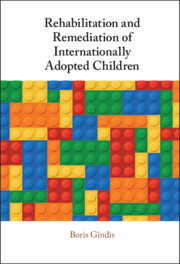Book contents
- Rehabilitation and Remediation of Internationally Adopted Children
- Rehabilitation and Remediation of Internationally Adopted Children
- Copyright page
- Contents
- Acknowledgments
- Introduction
- Chapter 1 Internationally Adopted Children
- Chapter 2 Developmental, Neuropsychological, Psychoeducational, and “Dynamic” Assessment of Internationally Adopted Children
- Chapter 3 Differential Diagnoses and the Structure of School-Based Recommendations for Internationally Adopted Children
- Chapter 4 Developmental Trauma Disorder Rehabilitation in Internationally Adopted Children
- Chapter 5 Cognitive Remediation of Internationally Adopted Children in School and Family
- Chapter 6 Language Remediation of Internationally Adopted Children
- Chapter 7 Academic Remediation of Internationally Adopted Children
- Chapter 8 Creation of Social and Cultural Competence in Internationally Adopted Children
- Chapter 9 Therapeutic Parenting as a Major Force in Rehabilitation and Remediation of Internationally Adopted Children
- Chapter 10 Transitioning to Adulthood Using the Individual Transitional Plan
- Conclusion
- Appendix
- References
- Index
Chapter 7 - Academic Remediation of Internationally Adopted Children
Published online by Cambridge University Press: 08 October 2021
- Rehabilitation and Remediation of Internationally Adopted Children
- Rehabilitation and Remediation of Internationally Adopted Children
- Copyright page
- Contents
- Acknowledgments
- Introduction
- Chapter 1 Internationally Adopted Children
- Chapter 2 Developmental, Neuropsychological, Psychoeducational, and “Dynamic” Assessment of Internationally Adopted Children
- Chapter 3 Differential Diagnoses and the Structure of School-Based Recommendations for Internationally Adopted Children
- Chapter 4 Developmental Trauma Disorder Rehabilitation in Internationally Adopted Children
- Chapter 5 Cognitive Remediation of Internationally Adopted Children in School and Family
- Chapter 6 Language Remediation of Internationally Adopted Children
- Chapter 7 Academic Remediation of Internationally Adopted Children
- Chapter 8 Creation of Social and Cultural Competence in Internationally Adopted Children
- Chapter 9 Therapeutic Parenting as a Major Force in Rehabilitation and Remediation of Internationally Adopted Children
- Chapter 10 Transitioning to Adulthood Using the Individual Transitional Plan
- Conclusion
- Appendix
- References
- Index
Summary
Schooling presents particular difficulties for IA children: they are not ready for this experience from many perspectives and are so emotionally fragile that they are traumatized when pushed by expectations beyond their reach. Educational deprivation in children adopted at school age raises the issue of “academic readiness” for age-appropriate school placement after adoption. The inappropriate schooling after adoption contributes to educational neglect and further traumatization of adoptees. Damaging misconceptions about IA children in school are no less than a traumatic component in the adopted child's adjustment. Readiness for school experience is one of the key issues in international adoption. This chapter discusses the academic placement of IA children and the concept of bidirectionality; the issue of retention vs. special education; mainstream education vs. remedial education for IA children; and major evidence-based remedial academic methodologies proven to be successful with international adoptees in math, reading, and writing. Academic remediation is needed for IA students who lack basic learning skills and academic knowledge to achieve expected competencies for continuation in the mainstream educational process. Although the majority of IA children need remedial instruction, a significant minority of IA children, who have educational handicapping conditions, need special education placement instructions and services, classroom accommodations, and test modifications.
- Type
- Chapter
- Information
- Publisher: Cambridge University PressPrint publication year: 2021



